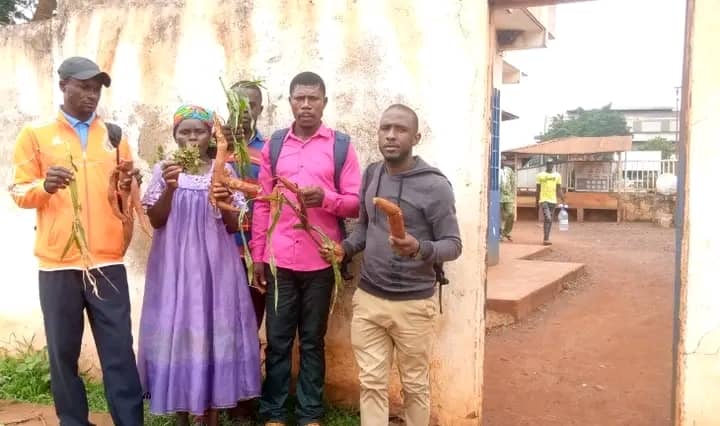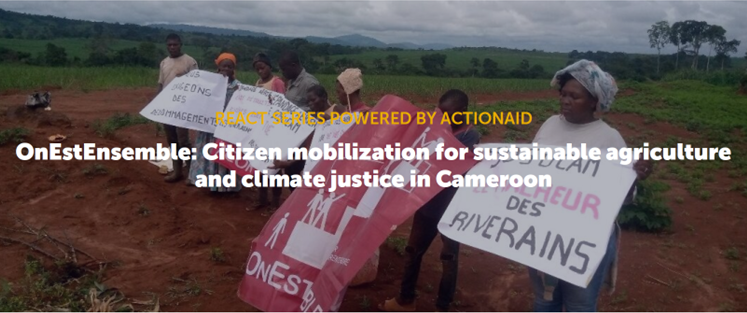OnEstEnsemble: Citizen mobilization for sustainable agriculture and climate justice in Cameroon

We were around twenty local residents, members of the association, from various villages located around 120 kilometers from the sugar plantations in central Cameroon. On July 6, 2023, we gathered peacefully in front of the headquarters of a multinational company in Yaoundé's administrative district to demonstrate our dissatisfaction with the destruction of our crops by the pesticides dumped on the fields by the company's planes. In protest, we dumped the contaminated and visibly burnt crops-cassava leaves, groundnuts-in front of the agro-industrial company's head office.
This citizen action, led by the OnEstEnsemble association, did not leave the company indifferent. Six days later, the multinational, Société Sucrière du Cameroun (SOSUCAM), a subsidiary of the French group Somdiaa, and ourselves met for talks in the presence of the mayor of the Cameroonian commune of Nkoteng. At the end of the meeting, SOSUCAM acknowledged its share of responsibility and agreed to compensate us in accordance with Decree No. 2003/418 of February 25, 2003 on crop compensation in Cameroon.
On July 23, a memorandum of understanding was signed between SOSUCAM and a number of local residents, following an assessment of the damage to the land estimated at nearly 6,000,000 Fcfa (equivalent to around 9,862 USD). Although this amount is far less than the damage suffered by all SOSUCAM's victims, the company's acknowledgement of wrongs represents a milestone victory in the fight for climate justice and healthy agriculture in Cameroon.
The aim of this article is to share some of the lessons learned from OnEstEnsemble's experience as a local non-violent campaign for environmental protection. In particular, when environmental demands are made jointly and based on verifiable facts, this legitimizes and justifies negotiation and strengthens demands in the face of decision-makers.
THE EMERGENCE OF ONESTENSEMBLE
In France, aerial pesticide spraying is banned because of the serious consequences for consumer health and biodiversity. In Cameroon, on the other hand, this destructive agricultural practice continues under the leadership of a French multinational. SOSUCAM sprays pesticides on a large part of the 25,000 to 30,000 hectares it farms in Cameroon.
Several Cameroonian farmers complained of the devastating effects of aerial spraying, including the destruction of food crops, water pollution and the disappearance of aquatic fauna. Manioc, peanuts, corn, yams, sweet potatoes, melons and fruit trees have all been rendered unfit for consumption.
In this context, the OnEstEnsemble association emerged in 2017 as a key player, mobilizing plantation neighbors to oppose the harmful practices of agribusiness.
ORGANIZING LOCAL RESIDENTS TO UNDERSTAND AND RESIST
OnEstEnsemble organizes the inhabitants of 20 villages bordering plantations into an ecosyndicate to strengthen their ability to defend their social, economic and environmental rights. With a community-based approach, OnEstEnsemble emphasizes the active involvement of community members in improving their living and working conditions, starting with their concrete concerns and deep-rooted aspirations.
To this end, OnEstEnsemble organizes local residents living near impacted sugarcane plantations and groups them around citizen committees (Riverains Ensemble), where they are strengthened and provided with educational resources and strategic advice. The training courses cover a wide range of subjects, including corporate responsibility with regard to human rights, advocacy, non-violent citizen mobilization and community organization. The aim of these training courses is to help local residents understand and become aware of the abuses they suffer at the hands of SOSUCAM, and then mobilize themselves to put an end to them.
Which brings us to the action in July 2023.
THE ONESTENSEMBLE ECOSYNDICATE IN ACTION
The action consisted in bringing the destroyed crops to the multinational's headquarters, where they were symbolically dumped in front of the company's entrance, not only to let them experience what we experience in our fields, but also to let them assess the extent of the damage.
So we set off from our villages early in the morning, with pesticide-burnt crops in sacks, by public transport bound for Yaoundé. Accompanied by other community rights associations, and with the support of the media, we mobilized in front of the company's headquarters and symbolically dumped our burnt crops on the ground. Spokespersons exchanged views with security, watched by many citizens and building employees, while other members sang songs of solidarity.
In the absence of the General Manager, we once again led a mobilization of a few members in front of the plantation management in Nkoteng. This time, we requested - and obtained - an appointment for talks with the manager. We wanted to have these talks right away, so when we went, we had already prepared the negotiation, in case we were received.
What the members were able to do better was to get together to put forward their demands, and above all to remain confident during the meeting.
A LASTING BATTLE
In view of the devastating activities of agro-industrial multinationals, the need for citizen action to ensure climate and ecological justice in Africa's agricultural sector is imperative. The mobilization of local residents of sugarcane plantations around the OnEstEnsemble association in Cameroon illustrates the need to put victims at the heart of the fight for climate justice. When organized, local populations are more effective than anyone else in stimulating profound social change. Putting the victimized community at the heart of the fight for climate justice is not only a factor of success, but also, and above all, of the fight's longevity.
We still have a long way to go to put a definitive and global end to the aerial spraying of harmful pesticides in Cameroon. So we're simply going to continue organizing and building a citizens' alliance to strengthen the consideration of our needs and for social and environmental justice.

